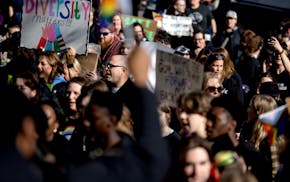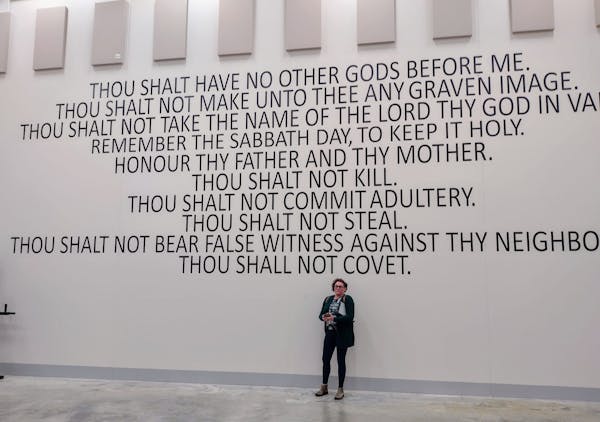Here are two good issues for figuring out what you really think about the proper role of religion and race in politics, education and the law.
First issue: Is it a legitimate concern that there aren't any Protestants on the U.S. Supreme Court? — and haven't been for a half-dozen years?
For a half-dozen years before Antonin Scalia died in February, the Supreme Court was composed of six Catholics and three Jews. For now it's five Catholics and three Jews, but it will be five Catholics and four Jews if Judge Merrick Garland is somehow confirmed. No Protestant has served on the high court since Justice John Paul Stevens retired in 2010.
This is fascinating in a country whose population contains a very strong Protestant plurality — an "only in America" phenomenon.
Religion scholar Stephen Protero at Boston University has noted that "Mainline Protestantism isn't a pressure group. It's not like the National Council of Churches is lobbying Obama to get a Lutheran appointed to the Supreme Court." And a Rice University professor, Michael Lindsay, has said that evangelicals "have put more effort into getting elected than in getting onto the bench."
But how should one think about this kind of judicial absence? I don't mind acknowledging that I take chauvinistic pride when one of my guys does something great, be it getting named to the Supreme Court or when Dodgers great Sandy Koufax shut out the Twins in the seventh game of the 1965 World Series. (Please note I didn't move to Minnesota until nine years later.)
But another part of me is made uncomfortable when Catholics, who make up 21 percent of the population, and Jews, who make up only 2 percent, have all the seats on the most powerful tribunal in the land, while Protestants, who make up 47 percent of Americans, have none.
Does such a judicial lineup take into sufficient account not only what our country "looks like" but how an immense number of citizens conceive the very stuff of life?
It's certainly not an intrinsically good thing that the current Supreme Court is without any Protestants. Yet at the very same time, it's keenly admirable that recent presidents, of both parties, haven't seemed to fixate on the faiths of the respective judges and scholars they have nominated. Also worthy is that no substantial number of citizens, starting with Protestants, have, well, protested, or seemed overly perturbed.
To the core question: Should presidents, in the name of balance, ever favor one faith tradition over another in appointing men and women to federal courts, and particularly the Supreme Court? Heaven's no. Or make that "hell no." The constitutional ideal of rejecting religious tests, as well as our instinctive, everyday practice of that principle, are two of America's greatest virtues and gifts to the world.
Begged here is the why. Why is our hesitation to take religion into account in decisions like these of a different and higher order than our reluctance to take race, ethnicity or gender into consideration? Why would an office-seeker promising to appoint more Baptists or Methodists to Cabinet posts induce more cringing and rebuttal than one who pledged to appoint more women or African-Americans?
An easy but fundamental point about religion's stand-apart power is that it's cited in the first sentence of the First Amendment — a sacred idea and admonition at the very top of revered guarantees. To also say that religion is intrinsically different because it runs soul-deep may likewise sound easy and obvious. But enormous numbers of people define themselves more by their faith than by any other facet of their lives.
Which is to say, Americans in the main learn early on that religion is a very big thing, if not necessarily for themselves, then for most fellow citizens. They learn that history is thick with how ugly things have happened when religion has been misused. They learn, in sum, that religion is simply but complexly different, not to be messed with, or in this instance employed and bandied about like common political grist.
Wide respect for such boundaries and traditions is one of our nation's most impressive traits — as witness, the lack of commotion over a Protestant-free Supreme Court.
• • •
The second tough but revealing issue involves higher-education admissions policies and the long-running debate over whether colleges and universities should ever take applicants' race and ethnicity into account in awarding seats.
Framing matters roughly: One side over the years has argued that race absolutely needs to be considered, given how African-Americans in particular have been discriminated against for centuries. To expect them, along with Hispanics and a few other groups, to do as well as whites on aptitude tests and other supposedly neutral measures is unreasonable in this view.
The other side, meanwhile, has argued that using race and ethnicity in admissions decisions violates the Constitution, or at least the principle of equal opportunity, divides the country, discriminates against whites, and demeans and actually hurts the intended beneficiaries of "affirmative action."
But what if using strictly colorblind admissions criteria — especially in terms of test scores — were to lead to a nonwhite minority group winding up with a disproportionate plurality of seats? Say, 40 percent of them, and at the nation's most competitive institutions? How might that sit, particularly with various supporters of strictly colorblind policies? Might they think matters out of whack if a group comprising only 6 percent of the population wound up filling 2 out of every 5 places in freshman and subsequent classes at Ivy League schools and similar institutions?
What recently got me going on the subject was an essay in the winter issue of City Journal by a lawyer named Dennis Saffran: "Fewer Asians Need Apply: How the Ivy League Discriminates Against Top-Achieving Students."
Citing a 2009 study, Saffran described how Asian students, who frequently do super on tests — but who generally are not considered protected-class minorities for affirmative-action purposes — face long odds when applying to elite colleges "three times as high as whites, six times as high as Hispanics, and sixteen times as high as blacks." Or in terms of test scores, to get into these schools, "Asians need SAT scores [on average] 140 points higher than whites, 270 points higher than Hispanics, and an incredible 450 points higher than blacks (out of 1,600 points) … ."
If such differentials were not in place, one could imagine Asian students comprising about 40 percent of students at top-tier colleges, as is already the case at Caltech, which doesn't look at race in admissions. Currently, Asian students make up about 14 percent to 19 percent of enrollments at schools like Harvard, Yale and Princeton.
If cornered, affirmative-action proponents, starting with admissions officers, might concede that demanding stronger credentials — often wildly stronger credentials — from Asian applicants, not just in comparison to black and Hispanic aspirants but also in comparison to white ones, inescapably results in giving "preferential treatment" to many white kids in getting into the schools of their dreams.
The irony here is beyond rich, as structurally favoring white applicants, often affluent ones, is 180 degrees from what affirmative action advocates have sought to achieve since the 1960s.
Question: If, on the other hand, you're against even the smallest acknowledgment of race in such situations, even at private institutions, would you be OK — be honest now — with Asian-American students more than doubling their seats at America's very best colleges and universities, with black and Hispanic as well as white students winning fewer seats as a result?
Frankly, for whatever honorable or less-than-honorable reasons, I was not wholly comfortable with such a prospect when I first read Saffran's essay. But I've come to be — as how could I not and remain consistent in my opposition to the perpetuation of race-based considerations where they don't belong.
So a final question, especially if you're not Asian-American: What say you of the conundrum?
Mitch Pearlstein is founder of Center of the American Experiment.
Readers Write: Presidential immunity, Sen. Nicole Mitchell
![O'Shaughnessy Stadium was photographed at the University of St. Thomas' St. Paul campus on Friday, Nov. 6, 2020. ] AARON LAVINSKY • aaron.lavinsky@s](https://arc.stimg.co/startribunemedia/4T767TPWMLRIJRHF67U45OBYDM.jpg?h=91&w=145&fit=crop&bg=999&crop=faces)
Editorial counterpoint: St. Thomas does work with its neighbors
Troubling talk on campus protests

Counterpoint: Anoka-Hennepin's DEI policies actually do warrant a debate

